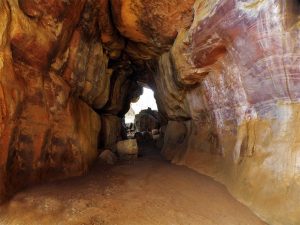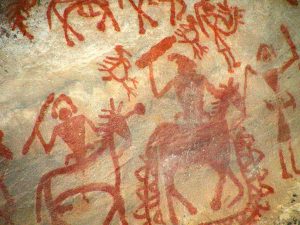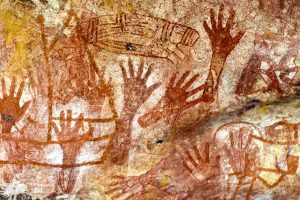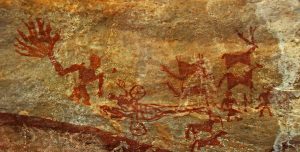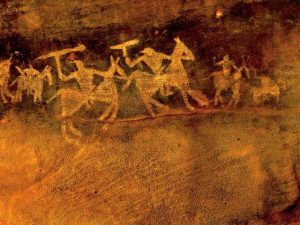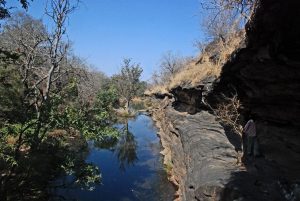30 Thousand Year Old Painting of Board Game in Bhimbetka Shelters, Madya Pradesh
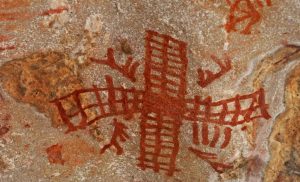 30,000 year old rock paintings found in the Bhimbetka caves in Bhanpura -Mandsaur in Madya Pradesh show, among other things, a painting of a board game. Unlike other cave paintings that show hunting and animals, this one is a clear indication of the mental development of the peoples who drew it. A clear blow, if any, to the fanatics of the world who try to place Indian Civilization as happening in the last few thousand years and after the newbie civilizations of the Greeks and Romans. Tens of thousands of years after this painting happened, the rest of the world will still be figuring out how many fingers they had..
30,000 year old rock paintings found in the Bhimbetka caves in Bhanpura -Mandsaur in Madya Pradesh show, among other things, a painting of a board game. Unlike other cave paintings that show hunting and animals, this one is a clear indication of the mental development of the peoples who drew it. A clear blow, if any, to the fanatics of the world who try to place Indian Civilization as happening in the last few thousand years and after the newbie civilizations of the Greeks and Romans. Tens of thousands of years after this painting happened, the rest of the world will still be figuring out how many fingers they had..Many other paintings in this cave system are dated 1 lakh years or older..
The Bhimbetka rock shelters are the collection of 750 rock shelters from which 500 are inwrought by the paintings. Situated in the Raisen District of Madhya Pradesh of India, these Stone Age rock paintings are around 30,000 years old. It is one of the largest repositories of prehistoric art in India. The shelters were designated a UNESCO World Heritage site in 2003. In addition to the cave paintings, archaeologists have unearthed large numbers of artifacts in the caves and in the dense teak forests and cultivated fields around Bhimbetka, the oldest of which are Acheulean stone tool assemblages. The Bhimbetka shelters exhibit the earliest traces of human life in India. A number of analyses suggest that some of these shelters were inhabited by hominids like Homo erectus more than 100,000 years ago. Some of the Stone Age rock paintings found among the Bhimbetka rock shelters are approximately 30,000 years old ( Paleolithic Age).
The name Bhimbetka is associated with Bhima, a hero-deity of the epic Mahabharata. The word Bhimbetka is said to derive from Bhimbaithka, meaning “sitting place of Bhima“. It is believed that when the five brothers, called Pandavas, were banished from their kingdom, they came here and stayed in these caves, the massive rocks seating the gigantic frame of Bhima, the second Pandava. However, these claim still remains to be corroborated with concrete evidence.
Read more at: http://www.mysteryofindia.com/2014/09/30000-years-old-rock-shelters-of-bhimbetka.html
The caves were eventually discovered in 1957-58 by accident. An archaeologist from Ujjain, Dr. Vishnu Wakankar, strayed too far from the beaten path and found himself amidst this prehistoric treasure trove. Since then more than 700 such shelters have been identified, of which 243 are in the Bhimbetka group and 178 in the Lakha Juar group. Between 1972 and 1977 excavation undertaken by Wakanakar, Misra and Hass revealed a continuous sequence of Stone Age cultures from the late Acheulian to the late Mesolithic and also some of the world’s oldest stone walls and floors.






